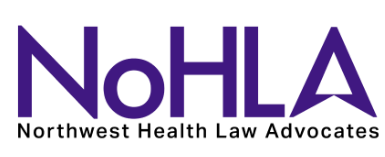TAKE ACTION! Comment by September 3 to make the most of Washington’s ACA consumer protections law!
This week, the Office of the Insurance Commissioner published new draft rules implementing SHB 1870. Public comments are due September 3. The 2019 legislation adopts in state law several key consumer protections in the federal Affordable Care Act (ACA), including the non-discrimination rules, even if federal rulemaking proposals, guidance, or legislation puts those protections in jeopardy nationally. It’s exciting to see the Commissioner moving forward to specify in practical terms what the new legislation means for consumers with individual and small group health plans that his office regulates. NoHLA is reviewing the draft and developing comments emphasizing how OIC can make the most of this opportunity to ensure the strongest possible protections against discrimination in health care. We hope you’ll find our past blog about the specific consumer protections helpful in writing your own comments. Comment to OIC on the draft rules using this simple form by Tuesday September 3 to let them know you support strong protections.
Yes, rulemaking comments really matter!
Why comment on proposed rules? And why do advocates for health care access launch campaigns for rulemaking comments, such as the recent effort to oppose the weakening of anti-discrimination protections (highlighted in our July blog)? Why is the number of public comments filed (260,000 on the public charge rule) important?
Rulemaking is an important part of the policymaking process, and comments do really matter. In the heat of the latest campaign, Mara Youdelman of the National Health Law Program (NHeLP) explained the federal rulemaking process and answered the question “Do My Comments Really Matter?” with a resounding “yes.”
Agencies have to review all comments, address significant issues raised, and explain whether they changed their proposals based on those comments. When a rule is challenged in court, the agency must “justify the changes it made to the rules even though it receives comments and data opposing the changes.” For example, when three states sought federal approval to impose work requirements in Medicaid, public commenters included both personal stories about why the changes might cause the commenters to lose their own Medicaid benefits and studies showing that work requirements are ineffective. Youdelman writes that when NHeLP challenged the work requirements in court, “the judge specifically noted the opposition to the proposals in the public comments and decided that HHS did not consider the impact on people who would lose health coverage. The result is that the judge stopped work requirements in these three states.”
At the state level, too, comments make a difference. Right now, Washington State agencies are focusing on fleshing out details and putting into action the 2019 Legislature’s unprecedented volume of health access legislation. They formally pre-propose, propose, and finalize through the Washington State Register the regulations that have the force of law, compiled in the Washington Administrative Code (WAC). Agencies including the Health Care Authority (HCA) and Office of the Insurance Commissioner maintain webpages with all their current rulemaking activity and helpful guides to the process. And as the OIC’s work following up the ACA protections law illustrates, agencies may make draft rules briefly available for comment — two weeks or so — before they publish the formal proposal that allows at least 45 days for public comment.
NoHLA engages in commenting on many regulations, focusing on opportunities to help improve access to health care. Our comments range from completely supporting to totally opposing federal and state agency initiatives, with many nuances in between. Above all, we seek to ensure that the agency follows the purpose and intent of the law. We look for important points in the act of Congress or the Legislature that the agency may have misinterpreted or left out. We urge considering related laws that the agency needs to take into account. We recommend exact wording changes that matter to health care access. And we take special care to advocate writing the rules that consumers are mostly likely to need to read so that people find what they need to know in one place, in plain language — and aren’t sent searching for other legal references. Often we comment jointly with other partners who represent the interests of patients and consumers, including civil legal aid and advocates for children, women, immigrants, people with disabilities, reproductive health, and civil liberties. When a point seems important and we need specific expertise, we know or find health practitioners and others to consult. Changes that we recommend are sometimes adopted, making for better and clearer agency application of the law to its beneficiaries.
It often requires more than official rules to make an act of the legislature fully effective. Administrative advocacy involves providing input into advisory groups, policy and practice guidelines, studies and reports, contracts, forms, and notices that inform individuals of their rights, responsibilities, and opportunities. Public comments matter all along the way, from adopting favorable policies, to applying those policies in agencies’ day-to-day work, to using the policies as a basis for defending individuals who are denied benefits to which they seek access, to potentially challenging unfavorable policies in court.
Rulemaking is critical to giving many health access laws their full effect, and commenting is essential to making consumers’ voices heard.
–Charlie Mitchell, NoHLA Senior Staff Attorney
TAKE ACTION! Comment by September 3 to make the most of Washington’s ACA consumer protections law!


